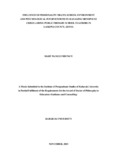INFLUENCE OF PERSONALITY TRAITS, SCHOOL ENVIRONMENT AND PSYCHOLOGICAL INTERVENTIONS IN MANAGING MENOPAUSE CRISES AMONG PUBLIC PRIMARY SCHOOL TEACHERS IN LAIKIPIA COUNTY, KENYA
Abstract
Menopause crisis is not considered a major issue in most organizations and therefore it is
disregarded at work place. Among female teachers, it may be worsened by unfavourable
working environment, personality traits and lack of psychological interventions but the
significance of these factors is not yet known in Laikipia County. This study examined
the influence of personality traits, school environment and psychological interventions
on menopause crisis for public primary schools‟ female teachers in Laikipia County.
Specifically, the study examined the influence of the physical environment, social
environment, personality traits and psychological interventions on menopause crises. The
study utilized ex post facto research design because it was not possible or acceptable to
manipulate the characteristics of human participants. The study was based on the PersonEnvironment-Occupation
Theory of Occupational Performance, Aaron Beck‟s
Behavioral Cognitive Theory and the Big Five theory of personality. The target
populations were 600 female teachers, 50 teacher counselors, 5 Sub County Directors of
Education in the Ministry of Education, giving a total of 655 respondents in Laikipia
County. The researcher used stratified sampling, two stage clustered sampling, random
sampling and purposive sampling techniques. The sample of the study was 289
respondents. The research instrument of the study was a structured questionnaire, Focus
Group Discussion and a key informant interview schedule. To ensure instruments
validity, expertise views from the lecturers in the School of Education Kabarak
University were incorporated in order to improve the face and construct validity of the
instruments. A pilot-test was done in the neighbouring Nyandarua County in order to test
the reliability of the research instruments. Both descriptive and inferential statistics were
used to analyze data aided by a computer based Statistical Package for Social Sciences
(SPSS) version 22. The statistical analysis entailed the computation of frequencies and
percentages. Informed consent was sought from the respondents before the
questionnaires were issued and an assurance given to them that the information they
provided would be treated with confidentiality. The findings revealed that personality
traits have a statistically significant influence on the psychological interventions of
menopause crisis with a Linear Regression analysis where (r
vii
2
=0.632; p-value of 0.0349)
which was significant at 0.05 level of significance as well as physical environment where
(r
2
=0.683; p-value of 0.0398) which is significant at 0.05 confidence level and social
environment at (r
2
=0.645; p-value of 0.03) which significant, while psychological
interventions was found to be significant at (r
2
=0.545; p >0.0390) at 0.05 confidence
level. From the findings of the study, it can be concluded that personality traits, school
environment and psychological interventions influence in managing menopause crisis. It
is recommended that counselors and should aim at helping menopausal female teachers
deal with their emotional instability. School administrators should provide working
environments that are conducive to the female teachers. Findings from the study
provided insight that it is helpful to school managers to identify some of the environment
related gaps in their schools that need to be addressed in order to make their working
environment more conducive to menopausal women. Policy makers will gain insight into
initiatives that could ensure women teachers undergoing menopause are least affected
psychologically and physically. It has also added to the body of knowledge on the matter
under study that could be beneficial to interested researchers, students and academicians.

